Our readers enjoy our browser market share stories, but sometimes complain in the comments that we don't do enough to compare the actual browsers. We've therefore decided to do some performance tests for the top five browsers (stable and beta versions) on Windows. This is not meant to be an exhaustive performance rundown, as we have not tried every test in existence nor did we run them on every browser for Windows. Also, please keep in mind that we have yet to identify a test that measures all the factors that influence the performance of a browser.
Thanks to the frequent release of nightly builds, it's practically impossible to test the latest version of a browser and post the results before they're already outdated, but the data here remains recent.
The setup
We used an Asus laptop for every test. It features an Intel Core 2 Duo T9600 processor at 2.80GHz, 4GB of DDR2 800 RAM, a 320GB SATA hard drive (7200 RPM), an Nvidia GT 240M graphics card with 1GB of DDR3 VRAM, and a 15.6-inch HD LCD display (1366 x768).
The first thing we did was add a brand new 50GB partition for a fresh copy of Windows 7 64-bit Ultimate. Then we let the hundred or so patches come through Windows Update. We made sure all the drivers were up-to-date, especially the graphics card's, and then we went out and downloaded all of IE8's best friends: Firefox 3, Chrome 6, Safari 5, and Opera 10. After running all the tests, we went out and grabbed the IE9 beta, Firefox 4 beta 6, Chrome 7 dev, a WebKit nightly, and Opera 10.70.
As a side note, we tried using the latest Minefield build instead of the latest Firefox build, but we couldn't get a single test to run without a crash. Also, when these tests were run, Chrome 8 was not yet available... but as you'll soon see, that didn't hurt Google's results.
The tests
The first test we performed is known as the SunSpider JavaScript Benchmark, and it's one of the most popular tests for measuring JavaScript performance. Version 0.9 was released by Apple's WebKit team in December 2007. We did not use version 0.9.1 this time because it was causing some of the nightly builds to crash.
The second test we used was the V8 Benchmark Suite, developed by Google. We used version 5 of the test because version 6 was not yet available.
The third test we ran was the Nontroppo General Browser Load-Time Test. It was used to test Opera 9.5, but still remains useful.
The last test is Peacekeeper: The Browser Benchmark. It is developed by Futuremark, a Finnish software development company known for its benchmarking software.
All the tests were run on the latest stable and the recent nightly build of each browser. We ran each test three times and then took the average score.
The Results
Before we jump right in, we want to make a quick note about 64-bit browsers. Internet Explorer is the only browser to have official 64-bit versions, so IE 64-bit is the only one we included in our tests. We don't explicitly compare the 64-bit version to the other browsers, since it's not a logical comparison, but the numbers are there for you to take a look at. We will say that, in the tests we did, 64-bit did not make a huge difference for IE.
Still, we did notice an odd pattern: while IE8 32-bit and 64-bit are pretty much on par in most tests, the 64-bit version of the IE9 beta is much worse than the 32-bit version. Given that a 64-bit version of Flash is on its way, we can expect 64-bit browsers to start arriving soon. Until then, though, we're going to stick to evaluating the 32-bit versions.
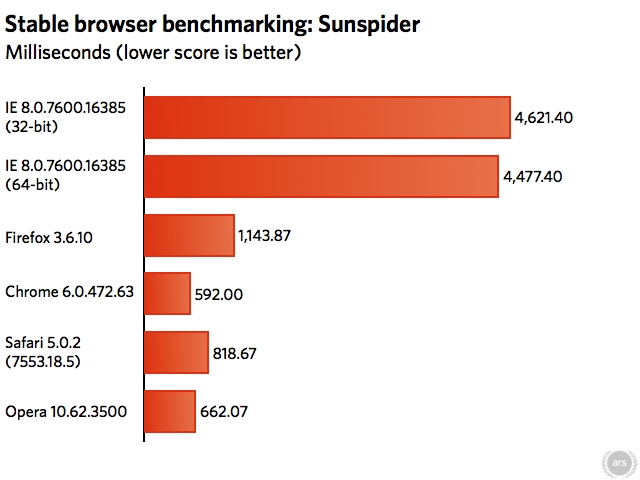
In this test, Chrome is the winner, with Opera close behind. The gap is larger between Opera and Safari, even larger between Safari and Firefox, and just huge for Firefox and Internet Explorer.
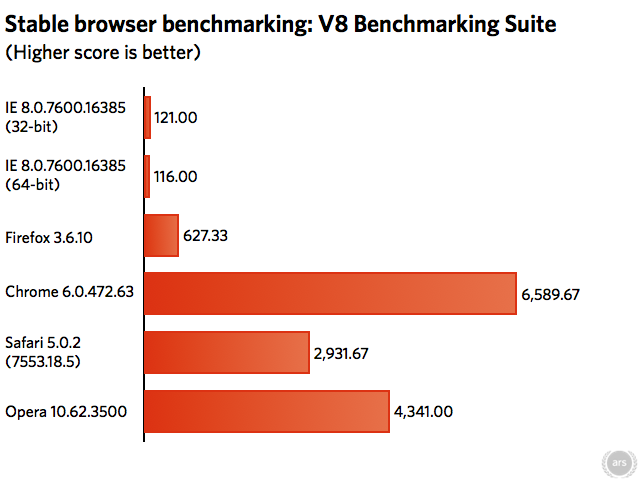
In this test, Chrome is the clear winner. Opera and Safari are both far behind, placing second and third respectively. Way back in fourth, Firefox isn't even close to competing, and Internet Explorer is not even worth mentioning.
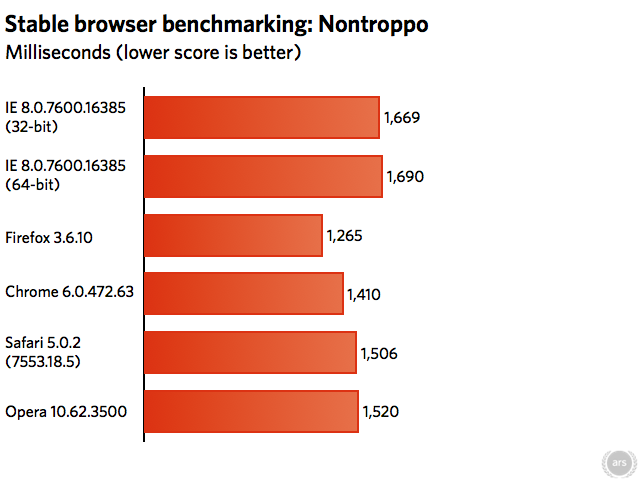
This test is a bit more even, and this time Firefox is the winner. Chrome still manages to take second; Safari is third with Opera just behind it, and once again Internet Explorer takes last place.
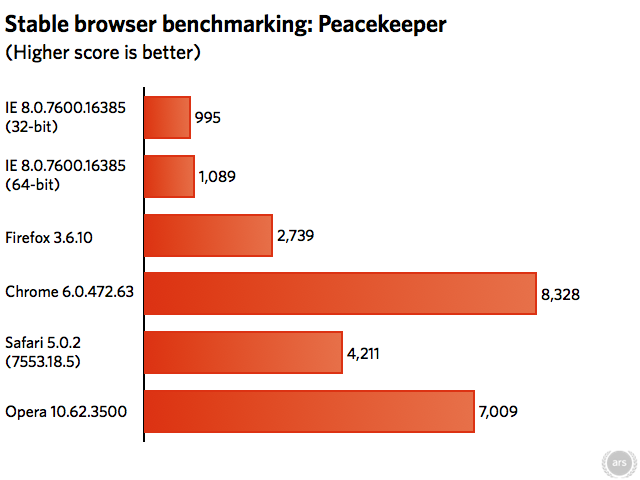
Chrome once again destroys the competition. Opera manages to keep pace in second place, and Safari has just over half of Chrome's score at third. Firefox takes fourth and Internet Explorer is dead last with an eighth of Chrome's score.
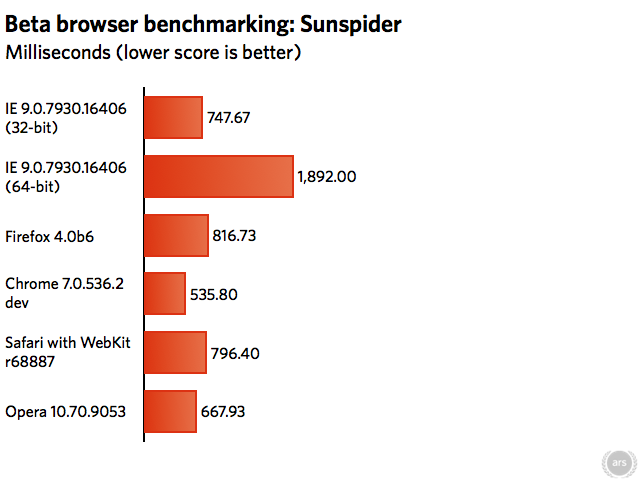
In this test, once again Chrome is first and Opera is second. When comparing the stable versions to the beta versions, we see that IE has moved from fifth to third, pushing Safari into fourth and Firefox into last. In raw numbers, IE has made the biggest improvement as well, while Opera actually did worse, though it kept its position.
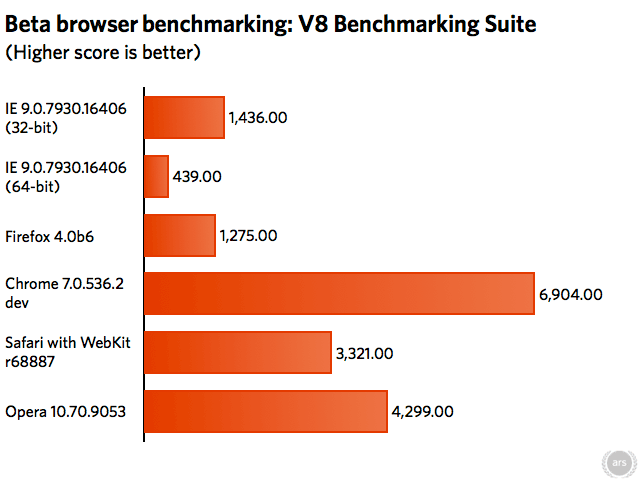
Chrome is significantly ahead in this test again, with Opera in second, and Safari in third with less than half of Chrome's score. When comparing the stable versions to the beta versions, IE has moved into fourth, pushing Firefox into last. In raw numbers, IE has made the biggest improvement again, and the nightly build of Opera actually did worse, though the browser once again kept its position.
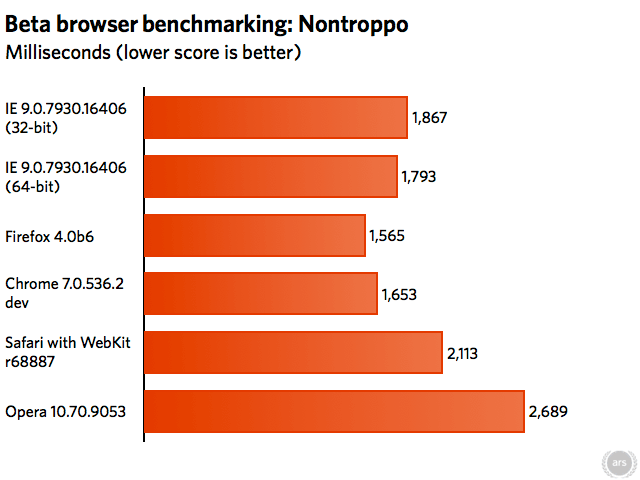
This time, Firefox snatches first place and Chrome takes second. When comparing the stable versions to the beta versions, IE has moved from fifth to third, pushing Safari into fourth and Opera into last. In raw numbers, all the unstable browsers did worse than their stable counterparts. IE managed to have the least change for the worse, while Opera saw the biggest decline.
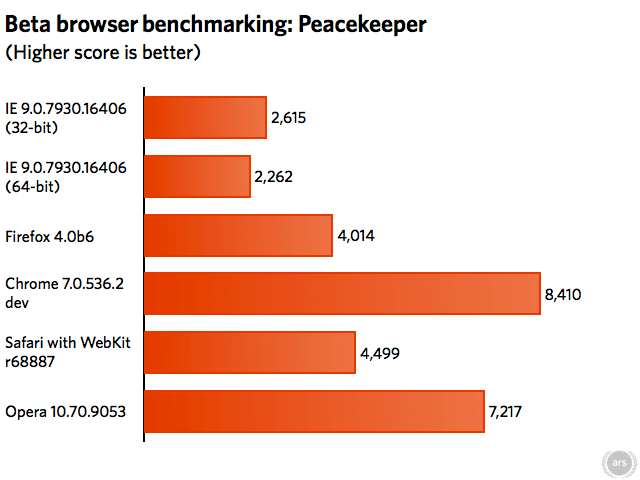
Chrome once again takes first and Opera snatches second. Safari and Firefox are close here but have to settle for third and fourth, respectively. Internet Explorer is in last. When comparing the stable versions to the beta versions, none of the browsers swapped places. In raw numbers, IE and Safari improved the most.
Chrome: it's fast!
Chrome is the obvious winner in these tests. It has a such a significant lead that we doubt it's going to be bumped out of the top spot anytime soon, especially if we take into consideration that the team wants to release a major version every six weeks. Still, competition in the browser market is only getting fiercer, so Chrome's king-of-the-hill status may not last forever.
reader comments
223